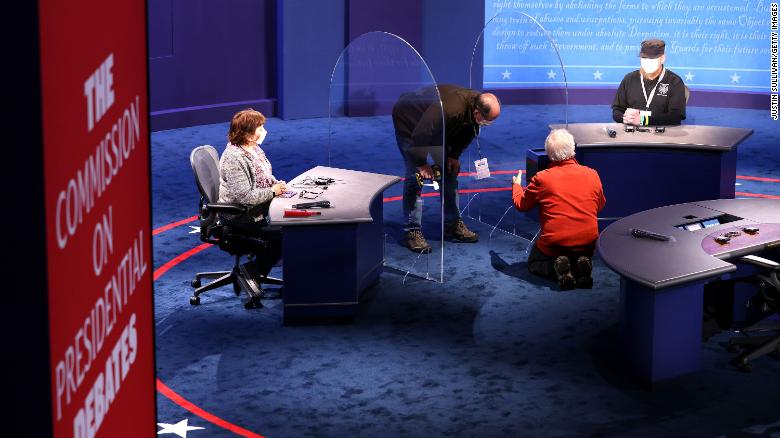This is an excerpt of the October 8 edition of CNN’s Meanwhile in America, the daily email about US politics for global readers. Click here to read past editions and subscribe.
Vice presidential debates are a bit like veeps themselves: a bit of a step down from the real thing.
But the extremity of the times lends unexpected gravity to the upcoming showdown between Vice President Mike Pence and Democrat Joe Biden’s running mate, Sen. Kamala Harris, in Salt Lake City, Utah, on Wednesday night.
Pence heads into the clash seeking to restore some coherence and equilibrium to President Donald Trump’s campaign following Trump’s derailed debate performance last week and hospitalization with Covid-19. Pence’s task is similar to that of then-Vice President Biden in 2012: steadying the ship after a rough first debate for the ticket topper, though Barack Obama’s stumbles had nothing on Trump’s tantrums in Ohio.
Harris, meanwhile, is on a mission to relentlessly turn the debate back to Trump — including his irresponsible claim Tuesday that the coronavirus was just like the flu, and his decision to blow up economic rescue talks with millions unemployed. She will want to show she’s ready to serve as president at a moment’s notice — a relevant question since Biden would be 78 when he took the oath of office — and defend against Pence’s efforts to brand her as an extreme liberal.
But should the debate be going ahead at all? Many medical experts say Pence should be quarantining, as the coronavirus spreads from its White House hot spot to Capitol Hill and to the Pentagon’s most senior military leadership. Incredibly, Pence — who runs the administration’s coronavirus task force — initially objected to protective plexiglass screens around each debater. It’s obvious why; such imagery would be ruinous to his boss’s completely false claim that there’s nothing to fear from Covid-19.
Whatever the result of the election, we won’t have seen the last of Pence and Harris. Vice presidential debates might be an undercard but they are often a showcase for the top political talent of the future — and a clue to later presidential campaigns.
‘We cannot afford to stop’
Trump’s abrupt decision to stop work on a new stimulus package until after the election surprised people on both sides of the aisle on Tuesday. The subject of months of negotiation, that money would have offered life support to the virus-stricken US economy. “I disagree with the President. With lives at stake, we cannot afford to stop negotiations on a relief package,” tweeted Republican Rep. John Katko, a New York lawmaker who represents a swing district. “I strongly urge the President to rethink this move.”
272 words
They’re calling it the Gettysburg Address.
Not really — someone else got there first. But walking in the footsteps of President Abraham Lincoln at the Civil War battlefield in Pennsylvania on Tuesday, Biden made his most forceful appeal yet for national unity amid the divisions of the Trump era.
“Today, once again, we are a house divided, but that, my friends, can no longer be,” the Democratic presidential nominee said, invoking one of the Great Emancipator’s most famous lines. “We are facing too many crises, we have too much work to do, we have too bright a future to have it shipwrecked on the shoals of anger and hate and division,” he said.
Biden pledged, if elected president in November, to lead a bipartisan effort to defeat the virus, to forge economic equality and to heal the antagonism that is tearing America apart. Promising to be a president for all Americans, he rebuked the critics who say he’s naive to think Republicans and Democrats can find common ground. And he proclaimed, like Lincoln did back in November 1863, that it was time for a “new birth of freedom,” warning that “the country is in a dangerous place. Our trust in each other is ebbing. Hope seems elusive.”
Given the pandemonium unfolding at the White House, the speech was the latest sign of Biden’s increasing political astuteness — a quality not much associated with his past presidential campaigns. As Trump’s behavior becomes ever more extreme, the Democratic nominee, who appears to be widening his lead in polls with four weeks to go, is offering the country something it hasn’t enjoyed for years: quiet normality.
‘Idle for weeks’
In the middle of a pandemic, the National Institutes of Health has been accused of forcing a top vaccines expert to “sit idle for weeks” out of political concerns. Dr. Rick Bright, the former director of BARDA, a US agency that helps fund and develop vaccines and other measures against pandemics and biological attacks, was transferred to NIH earlier this year, and he resigned Tuesday with a fiery letter released by his lawyers: “Although not allowed at NIH to utilize his expertise in vaccines or therapeutics, Dr. Bright developed a plan to implement a robust national testing infrastructure” for Covid-19, the letter said. It accused the agency of suppressing his recommendations, however, “for political reasons to the detriment of public health and safety.” And though you might expect the US to recruit all of its best talent in the battle against the virus, the letter said Bright had been assigned no real work for the past month.
>>>>

